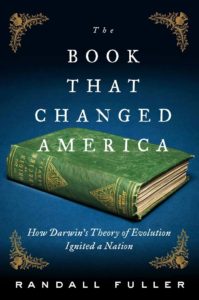The Book That Changed America: How Darwin’s Theory of Evolution Ignited a Nation

BOOK BY RANDALL FULLER
VIKING, 2017
302 PP.; $27.00
The Book That Changed America by Randall Fuller gives a well-researched and well-written account on the effect Charles Darwin’s views had on the course of American philosophy. What it doesn’t do nearly as well, despite its title, is explore the effect On the Origin of Species had on the country’s mass culture and the general public’s reaction to it.
When it was published and sent to America in late 1859, Darwin’s On the Origin of Species was dropped into a nation already boiling with pro- and anti-slavery rhetoric. John Brown had just been tried and hung, and he was a hero to Northern abolitionists. So it’s not surprising that Darwin’s theory was viewed through the prism of the slavery debate.
Fuller’s book primarily deals with the American intellectual elite living in Concord, Massachusetts, and closely associated with the scientific class at nearby Harvard University. This includes the pantheon of American philosophical, literary, and scientific thinkers, including Henry David Thoreau, Ralph Waldo Emerson, Bronson Alcott and his daughter Louisa May, and Harvard botanist Asa Gray, who became the book’s most notable American champion. Also included is Harvard’s Louis Agassiz, perhaps America’s foremost scientist at the time, and the one voice who did not accept Darwin’s theories.
To those adopting Darwin’s theory, his book was widely seen as a major weapon in defeating the idea that slavery was an institution set in place by God. Instead, all people, including blacks, shared a common descent. It’s important to note that Darwin’s book purposely did not deal with the descent of man (he would do so in his later book), although these implications were quickly drawn by readers. Actually, much of the impact of the book seems almost lost in the maelstrom that was the lead-in and start of the Civil War.
In some ways, it’s this conflict over slavery that undercuts the title of Fuller’s book. Rather than ignite a nation, Darwin’s book might be said to have added gas to an already combustible fire ignited by John Brown’s raid at Harper’s Ferry. Indeed, one of the drawbacks of Fuller’s narrow focus is that we are left wondering just what Southern leaders thought of the book other than thinking it funny to portray Lincoln in cartoons as having been descended from the apes.
Fuller’s writing is clear and concise, and his short portraits of the personalities he presents are lively and easy to read. He spends a good part of the early chapters outlining the American Transcendental movement that Darwin’s ideas so profoundly affected, and this can get a bit labored. To fully explore how Darwin’s book changed America, I would have preferred less time spent on this and more time on how other segments of the nation received the book, Southern pastors, for example, or Midwestern editors.
Still, the book is a fascinating read in what it does cover, and an interesting exploration of a time and place in US history that did have a profound effect on what came after.
